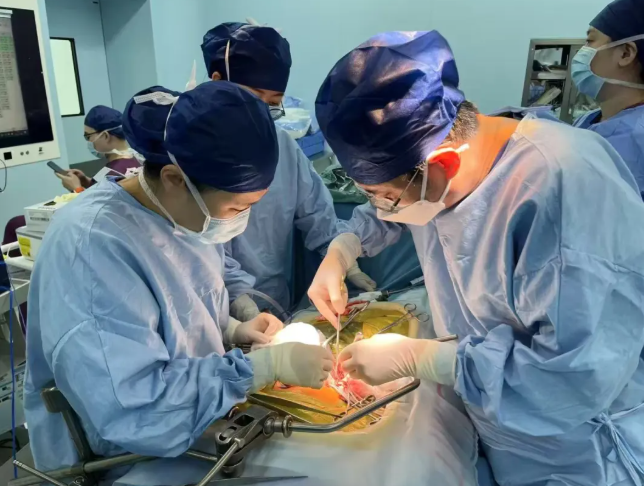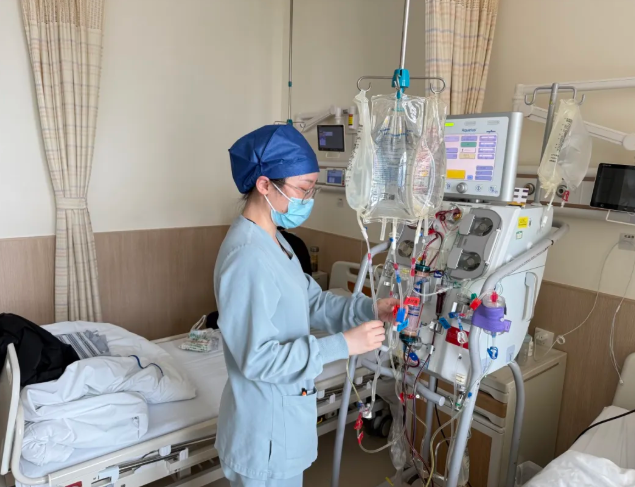- News
Shanghai General Hospital Pioneers Kidney Transplantation for Highly Sensitized Recipient Using Immunoadsorption and “Zero-Time Biopsy” Approach
https://mp.weixin.qq.com/s/V8DMwAvYYEkFh4maRxM9cw
Highly sensitized kidney transplant recipients—patients with elevated antibody levels and a high risk of rejecting donor organs—often develop sensitization due to multiple blood transfusions, pregnancies, or prior transplants. Among these, sensitization to human leukocyte antigens (HLA) is particularly critical and was once considered a contraindication for kidney transplantation.
Recently, Shanghai General Hospital successfully performed a kidney transplant for a highly HLA-sensitized uremic patient. The procedure was made possible through the collaboration of multiple departments, including Nephrology, the Kidney Transplant Team from the Urology Center, Anesthesiology, Transfusion Medicine, and Perioperative Nursing. The hospital implemented a comprehensive treatment strategy combining protein A immunoadsorption and a “zero-time biopsy,” collectively forming what is now known as the “Shanghai General Protocol” for managing highly sensitized transplant recipients.

The patient, a 56-year-old male, required a kidney transplant due to uremia. However, the presence of high-level HLA antibodies posed a high risk of hyperacute and antibody-mediated rejection post-transplantation, significantly threatening both the success of the surgery and the long-term survival of the graft.
To ensure the highest level of safety, the kidney transplant team led by Dr. Liu Zhihong from the Urology Center collaborated closely with Dr. Fan Qiuling’s nephrology team to devise a comprehensive perioperative management plan. This included immunoadsorption as the core therapy, supported by antibody-depleting agents such as rituximab and intravenous immunoglobulin, mycophenolic acid-based immunosuppression, intensive induction therapy using polyclonal antibodies, and transplantation with a donor kidney fully mismatched for the patient’s HLA antibodies.
During the perioperative period, the nephrology dialysis team employed protein A immunoadsorption technology. Leveraging the specific binding affinity of protein A for the Fc portion of immunoglobulin G (IgG), patient plasma was processed through protein A adsorption columns, efficiently removing panel reactive antibodies (PRA). Each treatment session required 8–10 cycles, lasting approximately 8 hours, and successfully reduced antibody levels to enable transplantation.
Simultaneously, a core team including Dr. Fan Qiuling, Dr. Zhang Rong, Dr. Wang Yue from Nephrology, and pathology technician Zhuge Yifeng, remained on 24-hour standby to perform a “zero-time biopsy”—a pre-implantation kidney biopsy conducted immediately prior to transplantation. This allowed precise pathological assessment of the donor kidney, ensuring organ quality and laying a solid foundation for a successful transplant.

On the day of surgery, Dr. Liu Zhihong, Dr. Zhang Fang, and Dr. Pan Qi from the Kidney Transplant Team completed the operation. Upon vascular reperfusion, the graft kidney demonstrated excellent perfusion and immediate urine output. Postoperatively, the nephrology team continued immunoadsorption therapy to prevent rejection. The patient’s graft function has since steadily improved and is returning to normal.
The combination of “zero-time biopsy” and immunoadsorption-centered perioperative care constitutes the “Shanghai General Protocol” for treating highly sensitized transplant patients. This protocol has significantly boosted the hospital’s kidney transplant volume and success rate. In 2025 alone, four successful transplants have been performed on highly sensitized recipients using this approach.
Currently, the nephrology dialysis team has established a comprehensive blood purification platform, offering a wide range of modalities including Continuous Renal Replacement Therapy (CRRT), Double Plasma Molecular Adsorption System (DPMAS), Double Filtration Plasmapheresis (DFPP), Hemoperfusion (HP), and Immunoadsorption (IA). This flexible system supports multiple departments across the hospital and enables precision therapy tailored to each patient’s condition—substantially improving outcomes for critically ill patients.
Contributors: Jin Jie, Shi Fang (Nephrology Department )
Edited by: Hu Yang, Cai Shishi ( Communications and Spiritual Civilization Department)
